虚拟条件句
英语语法知识虚拟语气

【导语】在⼤学英语六级考试中,单独考察六级语法的题型不多,但是语法知识点却贯穿整张试卷,下⾯是⽆忧考为⼤家整理的基础语法知识——虚拟语⽓。
1. 表⽰现在/过去/将来情况的虚拟条件句虚拟条件句主要有三种结构:1) 表⽰与现在情况相反:主句谓语⽤“would / could / might +动词原形”,从句谓语⽤“动词的⼀般过去时”(动词be的过去式⼀律⽤were)。
If I were you, I would not accept his offer.If I had time, I would certainly go to the cinema with you.2) 表⽰与过去情况相反:主句谓语⽤“would / could / might + have +过去分词”,从句谓语⽤过去完成时。
If I had got up a little earlier, I wouldn’t have missed the train.If I had been more careful, I might have passed that exam.3) 表⽰与将来情况相反:主句谓语⽤“would / could / might +动词原形”,从句谓语⽤“were +动词不定式”或“should +动词原形”。
If I were to do the job, I would not be able to have enough time to study.If it should rain tomorrow, I would not go out with you.2. 虚拟条件句连接词if的省略如果虚拟条件句的从句中含有were, had, should, could等词时,可以省略连接词if,但这时必须把were, had, should, could等词移到主语前⾯,形成倒装。
这种句型主要⽤于书⾯形式。
虚拟语气15种句型
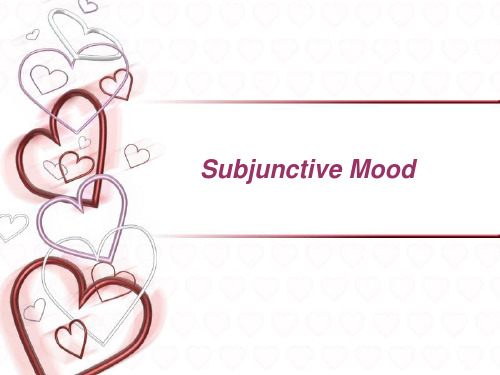
3.as if / as though后的表语或状语从句 (与wish相同)
含义 动 词 形 式
例句
现在 did / were
He looks as if he knew the little girl.
过去 Have done
It appeared as if nothing had
happened.
5.动词形式为(should)+do 的虚拟
2. It’s + adj.+that 的主语从句 (adj: necessary / essential/
important / natural / strange / possible / impossible
eg. It is important that we should attend the meeting.
• 对过去的猜测 • 肯定 must have done • 否定 can / could not have done • 可能 may / might have done
• 本应该做(实际没有做,有责备意思) • should have done • shouldn’t have done • 本来有必要作(实际没有做,不含责
desire 命令:order / command/ 坚持:insist 不管是动词还是名词,不管是主动还是被动
,不管是引导主语从句, 宾语从句, 表语 从句还是同位语从句, 都要用(should) do
5.动词形式为(should)+do 的虚拟
• My suggestion is that we should listen to his opinion first.
It is time that we stopped work and went home.
什么是虚拟语气的条件句

什么是虚拟语气的条件句?虚拟语气(Subjunctive Mood)是英语中一种特殊的语气形式,用于表示假设、愿望、建议、命令等非真实的情况。
虚拟语气在条件句(Conditional Sentences)中经常使用,以表达某种条件下可能发生的情况。
条件句分为三种类型:真实条件句(Real Conditional Sentences)、虚拟条件句(Unreal Conditional Sentences)和混合条件句(Mixed Conditional Sentences)。
在虚拟条件句中,常常使用虚拟语气来表示与事实相反的情况。
虚拟条件句分为两个部分:条件部分和结果部分。
条件部分陈述了一个假设或条件,而结果部分陈述了与该条件相关的可能结果。
以下是虚拟条件句的几个例子:1. 如果我有时间,我会去旅行。
(真实条件句)If I have time, I will travel.2. 如果我有时间,我会去旅行。
(虚拟条件句)If I had time, I would travel.3. 如果我有时间,我会去旅行。
(混合条件句)If I had time, I would have traveled.在虚拟条件句中,条件部分使用虚拟语气来表示与事实相反、或者是不可能实现的情况。
通常在条件部分使用过去时的形式,例如使用过去完成时或过去简单时。
结果部分则根据条件部分的虚拟语气形式进行相应的变化,使用would + 动词原形来表示结果。
需要注意的是,虚拟条件句中的动词形式取决于条件的类型和时间。
例如,对于与现在事实相反的情况,条件部分使用过去时,结果部分使用would + 动词原形。
对于与过去事实相反的情况,条件部分使用过去完成时,结果部分使用would + have + 过去分词。
对于与将来事实相反的情况,条件部分使用过去时,结果部分使用would + 动词原形。
总之,虚拟语气在条件句中用于表示与事实相反或不可能实现的情况。
虚拟语气分三种情况来掌握

虚拟语气分三种情况来掌握:1、虚拟条件句。
2、名词性虚拟语气。
3、虚拟语气的其他用语。
一、虚拟条件句:条件状语从句是非真实情况,在这种情况下要用虚拟语气。
1、条件从句与现在事实不一致,其句型为:If 主语+过去时,主语+should(could, would,或might)+动词原形,如:If I were you, I wouldstudyhard.If it rained, I wouldnot be here now.2、条件从句与过去事实不一致,句型为:If 主语+had+过去分词,主语+should(could, would,或might)+have+过去分词,如:If the doctor had come last night, the boy wouldhave saved.If I had not studie d hard, I wouldhave failed in the exam last term.3、条件从句与将来事实不一致,句型为:+do,主语+should(could…)+原形do过去时(与现在事实条件句一样)。
If it should rain tomorr ow, we wouldstay at home.If I were to go to the moon one day, I couldsee it with my own eyes.If you missed the film to night, you wouldfeel sorry.注意问题:1、If条件句中绝对不可出现“would”。
2、根据句中的时间状语,有时可能出现“混合虚拟”的情况,即主句可能是现在的情况,条件句也许是发生在过去的情况,但都是遵守上述句型。
3、在条件句中如果出现we re, had, should可省去if,将主语与这些词倒装,例如:Had the doctor come last night, the boy wouldhave saved.Were I to go to the moon one day, I wouldsee it with my own eyes.Should it rain tomorr ow, we wouldstay at home.二、名词性虚拟语气:在表示命令、建议要求、惊叹时的名词性从句中需用虚拟语气,基本句型:主语+(should)+动词原形,如:Mother insist ed that John go to bed at 9 o’clock.(宾语从句)We sugges ted that the meetin g should not be held.It was requir ed that the cropsshould be harves ted at once.(主语从句)The sugges tionthat he be invite d was reject ed.(同位语从句)That is theirdemand that theirwagesbe increa sed.(表语从句)注意:在这种句子中绝不出现“would”“must”“could”等。
高中英语虚拟语气的十大句型

高中英语虚拟语气的十大句型虚拟条件句:条件状语从句是非真实情况,在这种情况下要用虚拟语气。
1.条件从句与现在事实不一致,其句型为:句型1:If +主语+过去时,主语+should (could, would, 或might) +动词原形(1) If I were you, I would study hard.(2) If it rained, I would not be here now.2.条件从句与过去事实不一致,其句型为:句型2:If +主语+had+过去分词,主语+should(could, would, 或might)+have +过去分词(3) If the doctor had come last night, the boy would have been saved.(4) If I had not studied hard, I would have failed in the exam last term.3.条件从句与将来事实不一致,其句型为:句型3:If +主语+过去时/ should +动词原形/ were to+动词原形,主语+should (could, would, 或might) +动词原形(5) If it should rain tomorrow, we would stay at home.(6) If I were to go to the moon one day, I could see it with my own eyes.(7) If you missed the film tonight, you would feel sorry.注意问题:1.If条件句中绝对不可以出现would。
2.根据句中的时间状语,有时可能出现“混合虚拟”的情况,即主句可能是现在的情况,条件句也许是发生在过去的情况,但都要遵守上述句型。
如:(8) If you had studied hard before, you would be a college student now and you would graduate from a college in four years’time. 3.条件句中如果出现were, had, should可省去if,将主语与这些词倒装。
虚拟语气15种句型总结
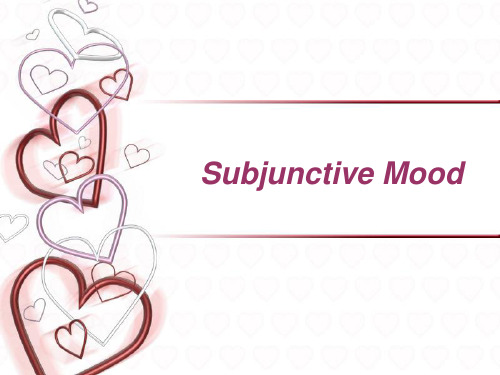
C.didn’t hurt; would go
D.didn’t hurt; would have gone
17 21 19
2.wish 后的宾语从句 = if only
含义
动词形式
对现状 表达愿望 Did / were
对过去表示 遗憾/后悔
Had done
例句
I wish I had a little lab of my own.
备意思)
• Need have done • Needn't have done
Practice
1. If I _k_n_e_w__ (know) her address, I would write to her. 2. What would you have done if you _h_a_d__m__is_s_e_d(miss) the train? 3. If he h__a_d_n_o_t_b__ee_n_ il(lnot be ill ), he would have done something. snows 4. If itw__er_e__to__/s_h_o_u_l_d__sn_o_w__/_s_n_o_w_e_d(snow) tomorrow, we _sh__o_u_ld__g_e_t_u_p_(get up) early.
• My suggestion that we should listen to his opinion first is being discussed.
• 注意当insist—硬说,suggest—表明, 不能有虚拟语气。
5.动词形式为(should)+do 的虚拟
2. It’s + adj.+that 的主语从句 (adj: necessary / essential/
语法虚拟语气中的虚拟条件句
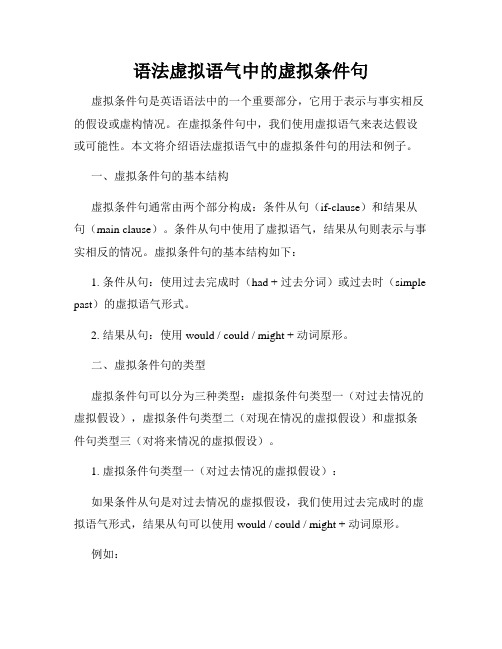
语法虚拟语气中的虚拟条件句虚拟条件句是英语语法中的一个重要部分,它用于表示与事实相反的假设或虚构情况。
在虚拟条件句中,我们使用虚拟语气来表达假设或可能性。
本文将介绍语法虚拟语气中的虚拟条件句的用法和例子。
一、虚拟条件句的基本结构虚拟条件句通常由两个部分构成:条件从句(if-clause)和结果从句(main clause)。
条件从句中使用了虚拟语气,结果从句则表示与事实相反的情况。
虚拟条件句的基本结构如下:1. 条件从句:使用过去完成时(had + 过去分词)或过去时(simple past)的虚拟语气形式。
2. 结果从句:使用 would / could / might + 动词原形。
二、虚拟条件句的类型虚拟条件句可以分为三种类型:虚拟条件句类型一(对过去情况的虚拟假设),虚拟条件句类型二(对现在情况的虚拟假设)和虚拟条件句类型三(对将来情况的虚拟假设)。
1. 虚拟条件句类型一(对过去情况的虚拟假设):如果条件从句是对过去情况的虚拟假设,我们使用过去完成时的虚拟语气形式,结果从句可以使用 would / could / might + 动词原形。
例如:- If I had studied harder, I would have passed the exam.(如果我当时学习更努力,我就能通过考试了。
)- If you had told me earlier, I could have helped you.(如果你早点告诉我,我本可以帮你的。
)2. 虚拟条件句类型二(对现在情况的虚拟假设):如果条件从句是对现在情况的虚拟假设,我们使用过去时的虚拟语气形式,结果从句使用 would / could / might + 动词原形。
例如:- If I were you, I would take the job offer.(如果我是你,我会接受这个工作机会的。
)- If she had more free time, she could help us with the project.(如果她有更多的空闲时间,她可以帮助我们完成这个项目。
虚拟条件句
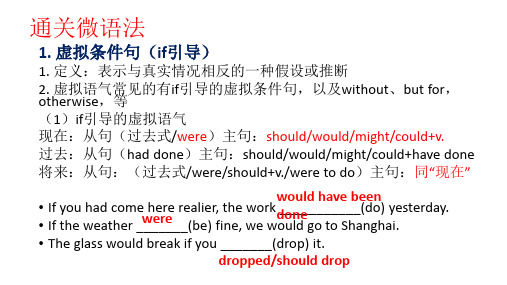
would have been
• •
If If
you the
had come here realier, the weather _w__e_re___(be) fine,
workd_o_n_e________(do) yesterday. we would go to Shanghai.
• The glass would break if you _______(drop) it.
通关微语法
1. 虚拟条件句(if引导)
1. 定义:表示与真实情况相反的一种假设或推断 2. 虚拟语气常见的有if引导的虚拟条件句,以及without、but for, otherwise,等 (1)if引导的虚拟语气 现在:从句(过去式/were)主句:should/would/might/could+v. 过去:从句(had done)主句:should/would/might/could+have done 将来:从句:(过去式/were/should+v./were to do)主句:同“现在”
• The glass would break if you should drop it. • =The glass would break should you drop it.
3. 错综时间条件句
1. 定义:条件从句与主句所指时间不一致,如从句指过去,主句指现在或 将来,此时根据语境,主从句的时态需要进行相应调整。 If it had rained last night, the ground would be wet now.(过去-现在) If he were to leave, you would have heard about it.(将来-过去) • If he had followed the doctor's advice, he _w_o_u__ld__b(ebe) better now. • If youh_a_d_w__o_rk_e_d(work) hard then, you would be in the university now. • if you hesitated this moment, you _m__ig_h_t_s_u_f_fe__r _(suffer) in the futue.
虚拟语气的构成

虚拟语气的构成虚拟语气是用来表示与事实相反、假设或愿望等非真实情况的语气。
它在语法上有一定的特点和构成方式,本文将就虚拟语气的构成进行详细探讨。
虚拟语气构成的要素包括虚拟条件句和主句中的虚拟动词形式。
一、虚拟条件句的构成虚拟条件句是构成虚拟语气的基础,主要包括三种形式:与现在事实相反、与过去事实相反以及与将来事实相反。
1. 与现在事实相反与现在事实相反的虚拟条件句使用“if + 过去式”或“were + to + 原形动词”的形式。
例如:If I were you, I would study harder. (如果我是你,我会更加努力学习。
)2. 与过去事实相反与过去事实相反的虚拟条件句使用“if + had + 过去分词”或“were +过去分词”的形式。
例如:If I had known the truth, I would have told you. (如果我当时知道真相,我会告诉你的。
)3. 与将来事实相反与将来事实相反的虚拟条件句使用“if + 动词过去式”或“were + to +动词原形”的形式。
例如:If it were to rain tomorrow, we would cancel the outdoor picnic. (如果明天下雨的话,我们会取消户外野餐。
)二、主句中的虚拟动词形式主句中的虚拟动词形式一般有以下几种:情态动词、过去式、过去完成式以及would, could, should等。
具体的用法如下:1. 情态动词情态动词用于表示非真实情况时,保持不变,不加任何后缀。
例如:If I had more time, I could help you. (如果我有更多时间,我可以帮你。
)2. 过去式主句中使用过去式时,表示与事实相反的虚拟情况。
例如:If I knew the answer, I would tell you. (如果我知道答案,我会告诉你。
)3. 过去完成式过去完成式用于表示过去某个时间点之前发生的事情。
虚拟句型结构及用法
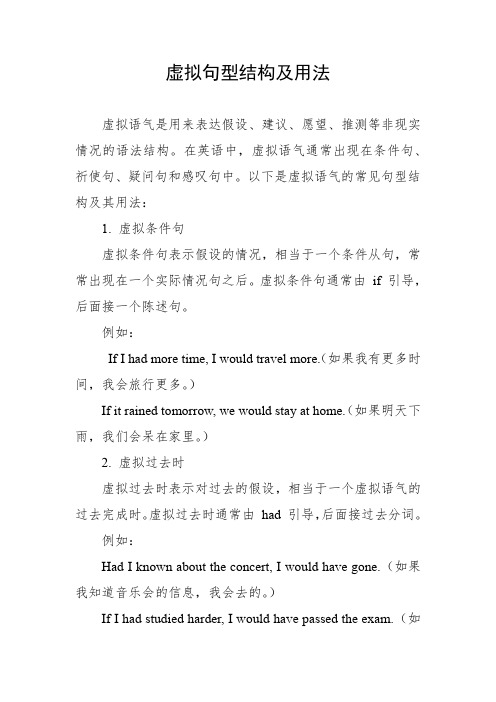
虚拟句型结构及用法虚拟语气是用来表达假设、建议、愿望、推测等非现实情况的语法结构。
在英语中,虚拟语气通常出现在条件句、祈使句、疑问句和感叹句中。
以下是虚拟语气的常见句型结构及其用法:1. 虚拟条件句虚拟条件句表示假设的情况,相当于一个条件从句,常常出现在一个实际情况句之后。
虚拟条件句通常由if 引导,后面接一个陈述句。
例如:If I had more time, I would travel more.(如果我有更多时间,我会旅行更多。
)If it rained tomorrow, we would stay at home.(如果明天下雨,我们会呆在家里。
)2. 虚拟过去时虚拟过去时表示对过去的假设,相当于一个虚拟语气的过去完成时。
虚拟过去时通常由had 引导,后面接过去分词。
例如:Had I known about the concert, I would have gone.(如果我知道音乐会的信息,我会去的。
)If I had studied harder, I would have passed the exam.(如果我学习得更努力,我会通过考试的。
)3. 虚拟将来时虚拟将来时表示对将来的假设,相当于一个虚拟语气的将来时。
虚拟将来时通常由should 或were to 引导,后面接动词原形。
例如:Should I go to the party?(我应该去参加聚会吗?)If she were to call me, what would I say?(如果她给我打电话,我会说些什么?)4. 虚拟祈使句虚拟祈使句表示对过去或将来的建议、命令或请求。
虚拟祈使句通常由should 或were to 引导,后面接动词原形。
例如:Should I go to the doctor?(我应该去看医生吗?)If I were to ask him, what would he say?(如果我问他,他会怎么说?)5. 虚拟感叹句虚拟感叹句表示对假设的情况的感叹。
写作如何使用虚拟语气

写作如何使用虚拟语气虚拟语气是英语中一种特殊的语法现象,用于表达与事实相反、与现实不符合或者虚拟的情况。
在写作中,使用虚拟语气可以增加句子的变化和表达的层次,使文章更加丰富有趣。
本文将详细探讨写作中如何正确使用虚拟语气。
一、虚拟条件句虚拟条件句常用于表达假设、愿望、建议等情况。
其基本句型为:如果+主语+动词的过去式,主语+would/could/should/might/oughtto+动词原形。
例如:- If I were rich, I would travel around the world.(如果我有钱,我会环游世界。
)- If he had studied harder, he could have passed the exam.(如果他学得更努力,他本可以通过考试的。
)注意,在虚拟条件句中,虚拟的动作或情况与现实相反或不可能实现,因此要使用过去式或过去完成时来表示。
二、虚拟表达愿望虚拟语气也常用于表达对现实情况的不满、愿望或建议。
常用的句型包括:- I wish/If only+主语+过去式(与现在事实相反)- I wish/If only+主语+had+过去分词(与过去事实相反)- I would rather+主语+过去式/过去完成时+(that)从句(表示偏好)例如:- I wish I had a car.(我希望我有一辆车。
)- If only I were taller.(要是我个子再高点该多好。
)- I would rather you came tomorrow.(我宁愿你明天来。
)注意,在虚拟表达愿望时,要根据具体情况选择使用过去式、过去完成时或模态动词。
三、虚拟表达建议虚拟语气还可用于表达建议、要求或命令。
常用的句型包括:- It is suggested/recommended/important/vital+that+主语+动词原形- It is demanded/required/necessary+that+主语+动词原形例如:- It is suggested that he take a break.(建议他休息一下。
虚拟条件句的构成与用法

虚拟条件句的构成与用法虚拟条件句是英语中一种常见的句型结构,用于表达假设情况下的可能性或不可能性。
在本文中,我们将探讨虚拟条件句的构成和正确用法。
一、第一类虚拟条件句第一类虚拟条件句用于表示现在或将来的假设情况,并提供与该情况相反的结果。
这种句型的结构是:if + 主语 + 动词的过去式,主语 + would/could/might + 动词的原形。
例如:- If I had more money, I would buy a new car.(如果我有更多钱,我就会买一辆新车。
)- If it rained tomorrow, we could stay at home.(如果明天下雨,我们可以待在家里。
)在这类虚拟条件句中,使用了虚拟语气来表达与事实相反的假设情况。
另外,需要注意的是,在if从句中,动词要使用过去式形式。
二、第二类虚拟条件句第二类虚拟条件句用于表示对过去事实的假设,也就是已经不可能发生的情况。
这种句型的结构是:if + 主语 + 过去完成时,主语 + would/could/might + have + 过去分词。
例如:- If I had studied harder, I could have passed the exam.(如果我学得更努力,我本来可以通过考试的。
)- If we had left earlier, we might have caught the train.(如果我们早点离开,我们可能赶上了火车。
)这类虚拟条件句中,通过使用过去完成时的动词来表达过去事实的假设。
在if从句中,动词需要使用过去完成时的形式。
三、第三类虚拟条件句第三类虚拟条件句用于表示对当前情况的假设,同时表达对过去事实的怀疑或遗憾。
这种句型的结构是:if + 主语 + 动词的过去完成时,主语 + would/could/might + 动词的原形。
例如:- If she had known about the party, she would have come.(如果她知道有派对,她就会来的。
虚拟条件句的形式和用法

虚拟条件句的形式和用法虚拟条件句是英语语法中的一个重要部分,它用于表示与现实相反的假设情况。
通过使用虚拟条件句,我们可以表达出一些不可能或未实现的情况,从而加深对语言的理解和运用。
虚拟条件句有三种形式,分别是虚拟条件句类型一、类型二和类型三。
虚拟条件句类型一用于表示与现在或将来相反的假设情况。
它的形式是:if +主语 + 动词的过去式,主句用would/could/might + 动词原形。
例如:If I were a bird, I would fly freely in the sky. 这个句子表达了一个与现在事实相反的假设情况,即我不是鸟,所以无法自由地在天空中飞翔。
虚拟条件句类型二用于表示与现在或将来事实相反的假设情况。
它的形式是:if + 主语 + 动词的过去式,主句用would/could/might + 动词原形。
例如:If I had a million dollars, I would travel around the world. 这个句子表达了一个与现在事实相反的假设情况,即我没有一百万美元,所以无法环游世界。
虚拟条件句类型三用于表示与过去事实相反的假设情况。
它的形式是:if + 主语 + had + 过去分词,主句用would/could/might + have + 过去分词。
例如:If I had studied harder, I would have passed the exam. 这个句子表达了一个与过去事实相反的假设情况,即我没有努力学习,所以没有通过考试。
虚拟条件句的用法并不仅限于以上三种形式,还可以通过其他方式来表达假设情况。
例如,可以使用“suppose”、“imagine”等词语来引导虚拟条件句。
另外,虚拟条件句也可以用于建议、愿望、命令等情况中。
例如:I suggest that you take a break if you feel tired.(如果你感到疲倦,我建议你休息一下。
虚拟条件句认识虚拟条件句的用法和表达方式
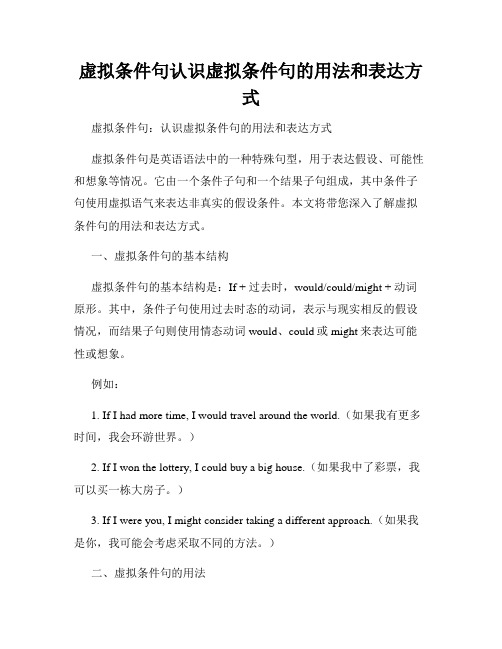
虚拟条件句认识虚拟条件句的用法和表达方式虚拟条件句:认识虚拟条件句的用法和表达方式虚拟条件句是英语语法中的一种特殊句型,用于表达假设、可能性和想象等情况。
它由一个条件子句和一个结果子句组成,其中条件子句使用虚拟语气来表达非真实的假设条件。
本文将带您深入了解虚拟条件句的用法和表达方式。
一、虚拟条件句的基本结构虚拟条件句的基本结构是:If + 过去时,would/could/might + 动词原形。
其中,条件子句使用过去时态的动词,表示与现实相反的假设情况,而结果子句则使用情态动词would、could或might来表达可能性或想象。
例如:1. If I had more time, I would travel around the world.(如果我有更多时间,我会环游世界。
)2. If I won the lottery, I could buy a big house.(如果我中了彩票,我可以买一栋大房子。
)3. If I were you, I might consider taking a different approach.(如果我是你,我可能会考虑采取不同的方法。
)二、虚拟条件句的用法1. 表达不可能实现的愿望或虚构的情况:If I were a bird, I could fly freely.(如果我是一只鸟,我就可以自由地飞翔。
)注:此处使用"were"而非"was",表示与现实相反的假设情况。
2. 表达与现实相反的假设条件:If it rained tomorrow, we wouldn't go to the park.(如果明天下雨,我们不会去公园。
)3. 表达过去的非真实假设:If I had studied harder, I would have passed the exam.(如果我学习更努力,我就能通过考试。
虚拟条件句与真实条件句的对比解析

虚拟条件句与真实条件句的对比解析条件句是英语语法中的重要部分,用于表达不同条件下的假设或现实情况。
其中,虚拟条件句和真实条件句是两种常见的类型。
本文将对这两种条件句进行对比解析。
一、虚拟条件句虚拟条件句用于表达与事实相反、虚构或假设的条件。
在虚拟条件句中,通常使用虚拟语气来表示与现实相悖的情况。
虚拟条件句有三种形式: Type 1 (第一型)、Type 2(第二型)和Type 3(第三型)。
在Type 1虚拟条件句中,假设的条件与现实可能相符,使用“if”引导从句,主句中使用模态动词“would”或“could”加上动词原形。
例如:If I had more money, I would travel around the world.(如果我有更多的钱,我会周游世界。
)在这个例子中,假设条件是“如果我有更多的钱”,使用了Type 1虚拟条件句的结构。
主句中使用了“would”来表示与现实相反的情况。
Type 2虚拟条件句用于表达对过去或现在的事实进行假设或与现实相反的情况。
在Type 2中,从句使用过去时态的动词,主句使用“could”或“would”加上动词原形。
例如:If I were you, I would study harder.(如果我是你,我会更加努力学习。
)在这个例子中,假设条件是“如果我是你”,因为现实中我并不是你,所以使用了Type 2虚拟条件句的结构。
Type 3虚拟条件句用于表达对已经发生的过去情况进行假设,事实与现在相反。
在Type 3中,从句使用过去完成时态的动词,主句使用“would have”加上过去分词。
例如:If I had studied harder, I would have passed the exam.(如果我努力学习了,我就能通过考试了。
)在这个例子中,假设条件是“如果我努力学习了”,由于现实中我并没有努力学习,所以使用了Type 3虚拟条件句的结构。
虚拟条件句的形式学会使用不同形式的虚拟条件句
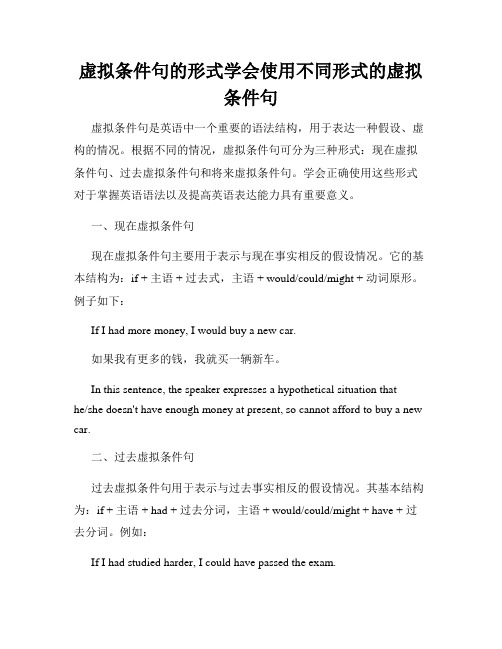
虚拟条件句的形式学会使用不同形式的虚拟条件句虚拟条件句是英语中一个重要的语法结构,用于表达一种假设、虚构的情况。
根据不同的情况,虚拟条件句可分为三种形式:现在虚拟条件句、过去虚拟条件句和将来虚拟条件句。
学会正确使用这些形式对于掌握英语语法以及提高英语表达能力具有重要意义。
一、现在虚拟条件句现在虚拟条件句主要用于表示与现在事实相反的假设情况。
它的基本结构为:if + 主语 + 过去式,主语 + would/could/might + 动词原形。
例子如下:If I had more money, I would buy a new car.如果我有更多的钱,我就买一辆新车。
In this sentence, the speaker expresses a hypothetical situation thathe/she doesn't have enough money at present, so cannot afford to buy a new car.二、过去虚拟条件句过去虚拟条件句用于表示与过去事实相反的假设情况。
其基本结构为:if + 主语 + had + 过去分词,主语 + would/could/might + have + 过去分词。
例如:If I had studied harder, I could have passed the exam.如果我学习更努力一些,我本来能够通过考试的。
The speaker regrets not studying harder in the past, which led to the failure of passing the exam.三、将来虚拟条件句将来虚拟条件句用于表示与将来事实相反的假设情况。
它的基本结构为:if + 主语 + were to + 动词原形,主语 + would/could/might + 动词原形。
虚拟条件句
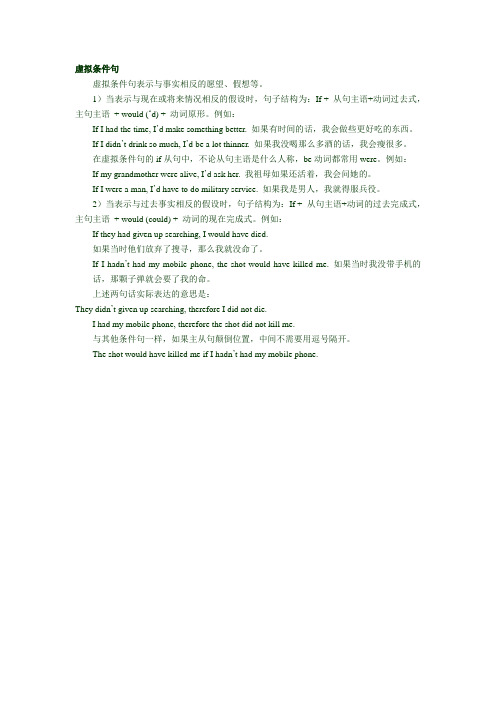
虚拟条件句虚拟条件句表示与事实相反的愿望、假想等。
1)当表示与现在或将来情况相反的假设时,句子结构为:If + 从句主语+动词过去式,主句主语+ would (‘d) + 动词原形。
例如:If I had the time, I’d make something better. 如果有时间的话,我会做些更好吃的东西。
If I didn’t drink so much, I’d be a lot thinner. 如果我没喝那么多酒的话,我会瘦很多。
在虚拟条件句的if从句中,不论从句主语是什么人称,be动词都常用were。
例如:If my grandmother were alive, I’d ask her. 我祖母如果还活着,我会问她的。
If I were a man, I’d have to do military service. 如果我是男人,我就得服兵役。
2)当表示与过去事实相反的假设时,句子结构为:If + 从句主语+动词的过去完成式,主句主语+ would (could) + 动词的现在完成式。
例如:If they had given up searching, I would have died.如果当时他们放弃了搜寻,那么我就没命了。
If I hadn’t had my mobile phone, the shot would have killed me. 如果当时我没带手机的话,那颗子弹就会要了我的命。
上述两句话实际表达的意思是:They didn’t given up searching, therefore I did not die.I had my mobile phone, therefore the shot did not kill me.与其他条件句一样,如果主从句颠倒位置,中间不需要用逗号隔开。
The shot would have killed me if I hadn’t had my mobile phone.。
- 1、下载文档前请自行甄别文档内容的完整性,平台不提供额外的编辑、内容补充、找答案等附加服务。
- 2、"仅部分预览"的文档,不可在线预览部分如存在完整性等问题,可反馈申请退款(可完整预览的文档不适用该条件!)。
- 3、如文档侵犯您的权益,请联系客服反馈,我们会尽快为您处理(人工客服工作时间:9:00-18:30)。
if引导的条件状语从句的分类及虚拟条件句的判断1、可以把条件句分为两类:1).真实条件句(Sentences of Real Condition):凡是假设的情况发生性可能很大,就是真实条件句。
例如:⑴、If I have time , I will help you with this work.如果我有时间会帮助你做此工作的。
⑵、As long as I say anything wrong, you must point it out.只要我说了什么错话,你一定要指出来。
⑶、If time permits, we'll go fishing together.(如果有时间的话,我们就一起去钓鱼。
)2).虚拟条件句(Sentences of Unreal Condition):当假设是不大可能实现时,就是虚拟条件句。
例如:⑴、If I were you , I would have attended the meeting. 如果我是你的话,就去参加会议了。
⑵、If he had come here yesterday, he would have seen his old friend.假如他昨天来这儿的话,就会看见他的老朋友。
⑴、If it had rained yesterday, we would have stayed at home.(如果昨天下雨的话,我们就会留在家里。
)2、.if条件状语从句中虚拟语气的判断判断是真实条件句还是非真实条件句。
只有在非真实条件句中才使用虚拟语气。
通过句子意思,看假设的条件是否能够实现,能够实现是真实条件句,不能使用虚拟语气;假设的条件不能实现则是非真实条件句,要用虚拟语气。
判断这个假设是与哪个事实相反。
通常有三种情况:①与过去事实相反。
②与现在事实相反。
③与将来事实可能相反。
3、“后退一步法”后退一步法是指在准确地判断了该句与哪一事实相反后,按虚拟语气的后退一步法处理从句谓语动词的时态。
即:在非真实条件状语从句中,谓语动词按正常情况“后退一步”。
也就是:①与过去事实相反,在从句中用过去完成时形式表示。
②与现在事实相反,在从句中用过去一般时形式表示。
③与将来事实可能相反,在从句中用过去将来时形式表示。
主句中则用情态动词would, should, could 等加一个与从句一致的动词形式。
例:⑴、If I had come her yesterday, I would have seen him.⑵、If I were a teacher, I would be strict with my students.⑶、If it should snow tomorrow, they couldn't go out.4、注意事项①if条件句中如有were, should, had,可以省去if,并使用倒装语序。
②在现代英语中if条件状与从句中的谓语动词如果是be其过去形式一般用were。
1. 虚拟语气在if条件状语从句中的用法设类型条件从句谓语动词形式主语谓语动词形式与现在事实相反动词的过去式(be用were而不用was) should/ would /could/ might+动词原形与过去事实相反had + 过去分词should/ would/could/might + have+过去分词与将来事实相反 1.should+动词原形2.动词过去式3.were to+动词原形should/ would/ could/ might +动词原形2. Wish 引导的宾语从句与现在事实相反过去时(were)与过去事实相反had+过去分词与将来事实相反would/could/might+动词原形I wish I were a bird.I wish he hadn‘t done that. (do)I wish I would be rich in the future.3. 表示要求,命令,建议的虚拟语气一个坚持 ___________ 两个命令_____________三个建议_____________四个要求____________Keys:1). insist 2). order, command3). advise, suggest, and propose 4). demand, require, request, desire 这些动词后面的宾语从句要使用虚拟语气用法。
即从句中的动词使用should + 动词原形, 或者将should省略。
The doctor suggested that he (should) try to lose his weight.He insisted that we (should) tell him the news.虚拟语气(二)the Subjunctive mood1. 表语从句、同位语从句中的虚拟语气在suggestion, proposal, order, plan, idea, advice, decision等需要有内涵的名词后面的表语从句、同位语从句中,要使用虚拟语气。
其谓语动词应用:should+原形动词。
另外连接从句的that不能省略。
例:My suggestion is that we should go there at once.What do you think of his proposal that we should put on a play at the English evening?2、It’s necessary/strange/natural/ important/pity/no wonder/impossible + that Clause 从句中的动词要用虚拟, 即(should)+动词原形It is strange that he (should) say so.他居然会这样说,真是奇怪。
It is a great pity that you (should) think so.他居然会这样想,真是一件憾事。
It is natural that a bird (should) rest in trees.鸟在树上安歇是很自然的。
It is necessary that he be sent to Beijing right away.有必要立即派他去北京。
3、在It is/was suggested /ordered / demanded / proposed / etc. 结构中要使用虚拟语气。
如:It‘s requested that we (should) keep the stability of the society for the people’s peaceful life.It’s suggested that the plan be carried out.It is ordered that all the troops (should) withdraw three miles away. 根据命令,所有部队撤至三英哩以外。
It is arranged that he leave for Canada on Friday. 照安排,他星期五动身去加拿大。
It is suggested that the English evening be held on Saturday. 有人建议,英语晚会周六举行。
4. would rather 后的宾语从句。
如:I would rather you could teach me again.The manager would rather that his secretary went to the meeting instead of him .经理宁愿他的秘书代替他去开会。
5. as if, as though引导的从句。
以as if 、as though(似乎,仿佛)引出的方式状语从,如果表示真实情况应该用直陈语气;如果表示非真实情况则应该用虚拟语气, 其谓语动词的虚拟式与wish后面宾语从句中谓语动词的虚拟式相同。
The little boy knows so many things as if he was a man.He acted as usual as though nothing had happened.1. The boy acted ____ he had never lived in Canada before.A. as thoughB. even ifC. asD. sinceKey:A6. 由if only (要是……,那该多好啊!)引导的惊叹句。
如:If only I had passed the test !If only it stopped raining!比较if only与only ifonly if表示"只有";if only则表示"如果……就好了"。
If only也可用于陈述语气。
I wake up only if the alarm clock rings. 只有闹钟响了,我才会醒。
If only the alarm clock had rung. 当时闹钟响了,就好了。
If only he comes early. 但愿他早点回来。
7. It is (high) time thatIt is (high) time that 后面的从句谓语动词要用过去式或用should加动词原形,但should不可省略。
It is time that the children went to bed.It is high time that the children should go to bed.It is high time that we had our lunch. 该是我们吃午饭的时候了。
It is time that he made up his mind. 该是他作出决定的时候了。
Step3 ExercisesSlide showMultiple choices1. It was urgent that he _________ her immediately.A. callsB.calledC.callD.would call2. It’s high time that something _________ to prohibit selling fake commodities.A. must be doneB.was doneC. be doneD. were done3. There was a traffic jam; otherwise I ____ here on time.A. would beB. had beenC. should beD. would have been4.The teacher agreed to the suggestion that the students ___ two weeks to prepare for the exam.A. giveB. should giveC. be givenD. would be given5.I didn’t go to the party, but I do wish I ___ there.A. wasB. wereC. had beenD. went6.It is strange that such a thing ___ in your school.A. will happenB. happensC. should happenD. happened7.I’d rather you ___ right away.A. leaveB. LeftC. will leaveD. to leave8.It is required that you ____ at six.A. will arriveB. arriveC. arrivedD. would arrive9. If only I _____ how to operate an electronic computer as you do.A. had knownB. would knowC. should knowD. knew Keys: CBDC CCBBDStep 4 Homework1.Finish exercises of Discovering useful structures.2. Preview Using Language.。
